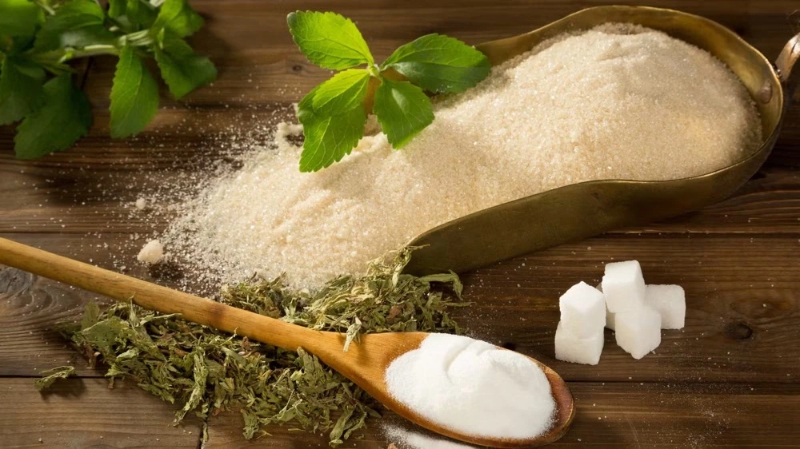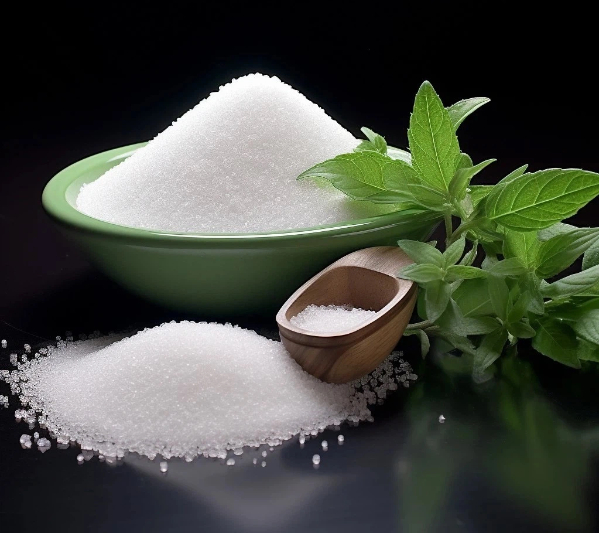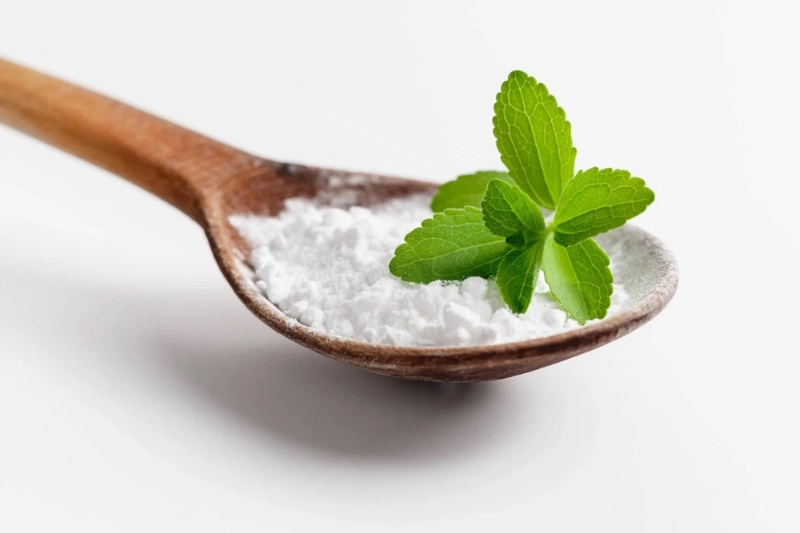Views: 222 Author: Sara Publish Time: 2025-09-12 Origin: Site








Content Menu
● Stevia vs. Artificial Sweeteners: Key Differences
● Are Stevia Sweeteners Considered Artificial?
● How Is Stevia Extracted and Processed?
● Benefits of Stevia Compared to Artificial Sweeteners
● Potential Challenges of Stevia Use
● Applications of Stevia in Food, Beverage, and Healthcare Industries
● Misconceptions About Stevia and Artificial Sweeteners
● Future Trends in Natural Sweetener Markets
● FAQ
>> 1. Is stevia considered an artificial sweetener?
>> 2. How sweet is stevia compared to sugar?
>> 3. Can stevia be used for baking?
>> 4. Is stevia safe for people with diabetes?
>> 5. What are the common side effects of stevia?
Stevia has become one of the most talked-about natural sweeteners in recent years due to its unique origin and health benefits. Many people wonder, "Is stevia artificial sweeteners?" This article will comprehensively explore what stevia is, how it compares to artificial sweeteners, its benefits and potential drawbacks, and its applications in the food, beverage, and healthcare industries. We will also incorporate relevant explanations to enhance understanding, provide a detailed conclusion, and offer answers to common questions related to stevia.

Stevia is a natural sweetener extracted from the leaves of the plant species Stevia rebaudiana, native to South America. The sweet compounds in stevia, mainly stevioside and rebaudioside A, are responsible for its intense sweetness – about 200 to 300 times sweeter than sugar. Unlike artificial sweeteners, stevia is derived from a plant source, which classifies it as a natural sweetener rather than an artificial one.
The stevia plant has been used for centuries by indigenous peoples in Paraguay and Brazil to sweeten local beverages and medicines. The renewed global interest in stevia stems from modern extraction technology that isolates its sweet components without harmful chemicals, producing a purified, stable sweetener suitable for mass-market applications.
Artificial sweeteners such as aspartame, saccharin, and sucralose are chemically synthesized substances designed to provide sweetness without calories. Stevia, however, offers a natural alternative with little to no calories:
| Feature | Stevia | Artificial Sweeteners |
|---|---|---|
| Origin | Natural (Stevia plant leaves) | Synthetic/chemically produced |
| Sweetness level | 200-300 times sweeter than sugar | Varies (100-600 times sweeter than sugar) |
| Caloric content | Zero or near zero | Zero |
| Safety concerns | Generally recognized as safe by health agencies | Some controversy and mixed safety studies |
| Taste profile | Slightly bitter or licorice aftertaste | Some have chemical or metallic aftertaste |
Stevia is not considered an artificial sweetener because:
- It is extracted directly from a natural plant source.
- The extraction process does not involve synthetic chemicals that change its natural molecular structure drastically.
- It is approved by international food safety organizations such as the FDA (U.S. Food and Drug Administration) and EFSA (European Food Safety Authority) as a natural sweetener.
This classification is important for consumers who prefer natural ingredients on product labels, and it supports stevia's role in clean-label product trends.

The process of harvesting stevia includes drying the leaves and extracting the sweet glycosides using water or alcohol-based solvents. These compounds are then purified and concentrated into powder or liquid forms for commercial use. This natural extraction method distinguishes stevia from fully synthetic artificial sweeteners.
Advanced purification technologies ensure that impurities and compounds responsible for the bitter aftertaste are reduced, improving stevia's flavor profile for better consumer acceptance. Some manufacturers blend stevia extracts with other natural sweeteners or bulking agents to balance taste and texture.
- Natural Origin: Preferred by consumers seeking clean-label products with recognizable ingredients.
- No Calories: Suitable for diabetics and individuals managing their weight, as it does not add to caloric intake.
- Dental Health: Unlike sugar, stevia does not contribute to cavities or tooth decay, making it ideal for oral health-conscious products.
- Heat Stability: Stevia withstands high temperatures, enabling its use in baked goods and cooked dishes, unlike some artificial sweeteners that degrade.
- Potential Health Benefits: Emerging research suggests stevia may have additional health benefits, such as modest blood pressure reduction and improved blood sugar regulation.
- Taste: Some consumers detect a bitter or licorice-like aftertaste. This is linked to the specific glycosides present in the extract and can be improved with refining or blending.
- Formulation: Because stevia is intensely sweet, manufacturers must carefully balance concentrations in recipes to avoid overpowering sweetness or aftertastes.
- Regulatory Limits: Different countries have established acceptable daily intake (ADI) levels for stevia extracts. Excessive use beyond these limits is not recommended.
- Market Education: While acceptance is growing, some consumers remain unfamiliar with stevia's natural origins and benefits, requiring product labeling and marketing efforts for education.
Our Chinese factory specializes in supplying natural sweeteners like stevia, functional polyols, and dietary fibers. Stevia is widely used in a variety of products:
- Beverages: Including soft drinks, iced teas, flavored waters, energy drinks, and health tonics to reduce sugar content without sacrificing sweetness.
- Baked Goods and Confectioneries: Used to produce sugar-reduced cookies, cakes, chocolates, and candy, appealing to health-conscious consumers.
- Dairy Products: Common in yogurts, ice creams, and flavored milk, where sweetness needs careful balancing with texture.
- Dietary Supplements and Healthcare Products: Tablets, powders, and liquids formulated for people with diabetes or those focused on weight management.
Stevia also pairs well with functional polyols like erythritol and other natural fibers, combining sweetness with bulking properties for improved mouthfeel and product stability. Our factory offers blended sweetener development and tablet production services under OEM/ODM agreements, providing tailor-made solutions that incorporate stevia's benefits.
The safety of stevia has been extensively researched over decades. Clinical studies and regulatory reviews by FDA, EFSA, and WHO confirm that purified stevia glycosides are safe for consumption within established limits.
People who consume stevia as part of a balanced diet rarely experience adverse effects. However, as with any sweetener, excessive intake beyond recommended levels should be avoided. Our factory ensures product quality and compliance with international standards, supporting safe and effective use by global manufacturers.
It's important to debunk common misconceptions:
- Not all sweeteners that taste sweet and are used to replace sugar are artificial.
- The natural origin of stevia differentiates it clearly from synthetic alternatives.
- Some "natural sweetener blends" include both stevia and artificial sweeteners, so label reading is crucial to meet consumer preferences.
- Concerns about stevia's safety are largely linked to older, unrefined compounds; modern purified extracts are well-studied and approved.
The global food and healthcare landscape is shifting toward natural, healthier alternatives, fueling demand for stevia-based sweeteners. Manufacturers seek innovative extraction methods to enhance taste, reduce aftertastes, and improve solubility and stability.
Hybrid sweetener blends combining stevia with other natural ingredients such as monk fruit or functional polyols are becoming increasingly popular. These blends optimize sweetness profiles and offer nutritional advantages.
Sustainability also plays a role, as stevia cultivation requires less water and land compared to sugarcane or beet cultivation, aligning with environmental goals.
Stevia is a natural sweetener derived from the leaves of the Stevia rebaudiana plant and should not be classified as an artificial sweetener. It offers numerous benefits, including a natural origin, zero calories, safety, and versatile applications across food, beverage, and healthcare sectors. Despite minor taste challenges, stevia's acceptance as a natural, effective sugar alternative continues to grow, supported by ongoing research and consumer demand for healthier, natural products. For manufacturers and consumers alike, stevia represents an excellent natural choice compared to synthetic options, providing a sustainable and consumer-friendly sweetening solution.

No, stevia is a natural sweetener derived from the stevia plant leaves. It is not artificially synthesized.
Stevia is approximately 200 to 300 times sweeter than sugar.
Yes, stevia is heat-stable and suitable for baking, though it may sometimes require recipe adjustments due to its intense sweetness.
Yes, stevia has negligible effect on blood glucose levels, making it safe for diabetics when used in moderation.
Stevia is generally safe, but some people may experience mild digestive issues or dislike its slight aftertaste.
